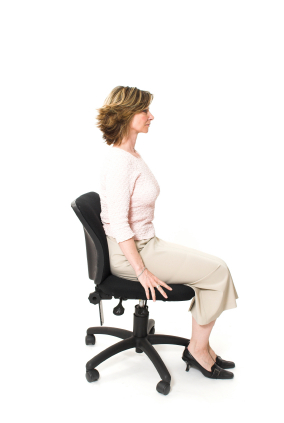Eliminate Bad Posture Habits Once And For All
February 7, 2011 by Eric
Filed under Fitness and Exercise
Don’t Slouch! Your posture depends on it… Didn’t your mother tell you?
Improve your posture
It’s easy to develop poor posture, yet it takes conscious effort to develop and maintain good posture. Good posture reaps more benefits than the common slouching position. Bad posture is not just a bad habit; it can be seen in people with fatigue, low self-esteem, depression, obesity, and can make the pain in your joints worse.
Getting your day started with good posture.
• Stand with your arms stretched above your head as if your trying to touch the clouds.
• Give yourself a big hug. Wrap your arms around yourself and twist gently to both sides.
• Keeping your abdominal muscles strong when doing your regular exercise routine will help keep your spine in the proper position.
• Try looking at your posture in the mirror. Are you standing like your back is to a wall or are you slouching? Try to keep a good posture throughout the day’s activities and don’t worry about not constantly having good posture. Just fix it when you see that it’s not correct.
Carrying the everyday items.
• Carry only what you need to for that day to avoid additional weight.
• Avoid items that are heavy on the shoulder and can’t be adjusted to comfort. This can cause pain in the neck, shoulder, and back.
• Try to carry items that have a strap that can be placed over the head on the opposite side of the body as the item being carried. This will help distribute the weight and will be less strenuous to the one side of your body.
Backpacks are used by people of all ages and lifestyles from students, to office employees and even grandparents! Many people unknowingly use backpacks improperly, overloading them and packing them improperly. A backpack should never be loaded to more than 15 percent of an individual’s body weight or over 25 pounds.
A few good backpack tips.
• Use a backpack made from lightweight material
• A backpack with adjustable shoulder straps that are wide and padded
• Wear the backpack properly using both shoulder straps and if possible find one with hip straps
• Always pack heavier items closer to your back to provide more support and stability
When working at a desk.
• Use furniture that is ergonomically designed
• Sit up straight with your back firmly against the back of the chair keeping your knees even and shoulders parallel with your hips.
• A footrest should be considered when sitting for long periods of time
• A pillow or rolled up towel behind you should be able to provide extra support if it is needed
• Your workstations should sit about elbow height; most office chairs are adjustable to make this possible
• Tilt computer screen to eye level to avoid slouching to view the screen.
Good sleeping habits.
• Using a firm or orthopedic mattress will help keep your back aligned. Try sleeping on your back or side instead of your stomach.
• If you’re more comfortable sleeping on your back, try putting a pillow or rolled blanket under your knees to relieve the pressure in your lower back.
• To help keep your spine straight while lying on your side, place a pillow between slightly bent knees.
• We all love those warm, inviting, over stuffed pillows, but they can be harsh on your spine. It’s best to use a pillow that allows your head to be aligned with your spine.
The results of not correcting your bad posture habits are many, from poor blood circulation, to pressure in the chest and pain in joints; over time you can even be more susceptible to and suffer from an increased risk of having slipped disc issues. However, there are many rewards to good posture, such as less frequent headaches, improved self image and confidence.


